

Zoe 1-Compost Systems. The first decision you must make to compost at home is what type of compost bin or system to use.
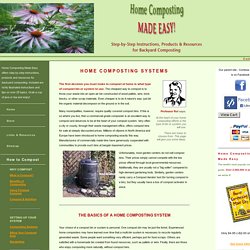
The cheapest way to compost is to throw your waste into an open-air bin constructed of wood pallets, wire, brick blocks, or other scrap materials. Even cheaper is to do it nature's way: just let the organic material decompose on the ground or in the soil. Many municipalities, however, require quality covered compost bins. If this is so where you live, then a commercial grade composter is an excellent way to compost and deserves to be at the heart of your compost system.
Very often a city or county, through their waste management office, offers compost bins for sale at steeply discounted prices. Unfortunately, most garden centers do not sell compost bins. Zoe 2- Resource Conservation - Types of Composting. Backyard or Onsite Composting Backyard or onsite composting can be conducted by residents and other small-quantity generators of organic waste on their own property.
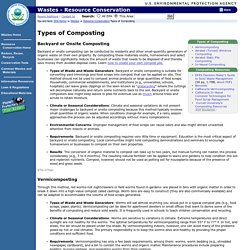
By composting these materials onsite, homeowners and select businesses can significantly reduce the amount of waste that needs to be disposed of and thereby save money from avoided disposal costs. Learn how to create your own compost pile. Zoe 3-Vermicomposting - Composting with Worms. Vermicomposting: Composting with Worms by Soni Cochran, Extension Associate NOTE: The following information is for the home vermicomposting enthusiast.
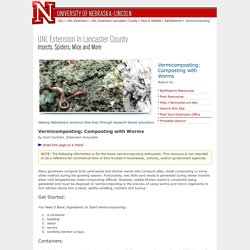
This resource is not intended to be a reference for commercial bins or bins located in businesses, schools, and/or government agencies. Zoe 4- Bokashi Composter Reviews and 'How to' Videos. A bokashi composter is a great addition to your composting arsenal.
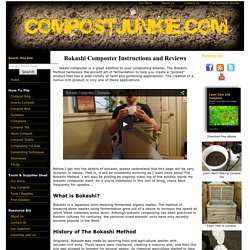
The Bokashi Method harnesses the ancient art of fermentation to help you create a "pickled" product that has a wide variety of farm and gardening applications. The creation of a humus-rich product is only one of these applications. Before I get into the details of bokashi, please understand that this page will be very dynamic in nature. That is, it will be constantly evolving as I learn more about The Bokashi Method. I will also be posting an ongoing video log of the activity inside my bokashi composter itself. Zoe 5- Smartbins - Easy Indoor Composters - Direct Compost Solutions. The number of pots you will need depends entirely on your family size, garden size, how much organic waste you produce and how much waste you want to dispose of in your garden.
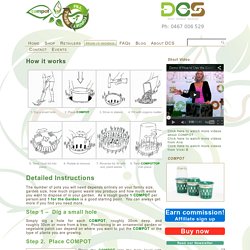
As a rough guide 1 COMPOT per person and 1 for the Garden is a good starting point. You can always get more if you find you need more. Step 1 – Dig a small hole Simply dig a hole for each COMPOT, roughly 30cm deep, and roughly 30cm or more from a tree. Positioning in an ornamental garden or vegetable patch can depend on where you want to put the COMPOT or the type of plants you are growing. Step 2. Place the COMPOT into the hole level with the ground. Zoe 7- Waterless composting toilets by Ecoflo Wastewater Management. Zoe 8- Clivus Multrum - Composting Toilet Systems Australia - Home. Zoe 9- Eco Toilets - How they Work - Nature Loo. Overview | Installation | Moisture | Oxygen | Temperature | Pathogens Nature Loo’s eco toilets provide a hygienic method of recycling human waste.
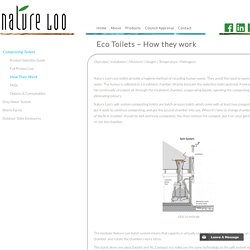
They avoid the need to waste and pollute precious water. The humus is collected in a treatment chamber directly beneath the waterless toilet pedestal. A low powered 12 volt electric fan continually circulates air through the treatment chamber, evaporating liquids, speeding the composting process and eliminating odours. Eco Friendly Houses - Composting Toilet. You are here: home » Household Tips » plumbing » composting toilet Composting toilets range from simple twin chamber designs through to advanced systems with rotating tynes, temperature and moisture probes and electronic control systems.

They are effective biological converters of human and household "waste," saving money and energy for the person and community. Compost company turns food waste into profit. Leaves, grass, horse manure.
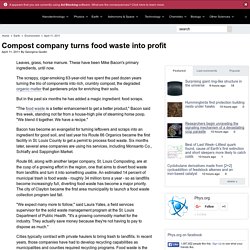
These have been Mike Bacon's primary ingredients, until now. The scrappy, cigar-smoking 63-year-old has spent the past dozen years turning the trio of components into rich, crumbly compost, the degraded organic matter that gardeners prize for enriching their soils. But in the past six months he has added a magic ingredient: food scraps. Composting. What is Composting?
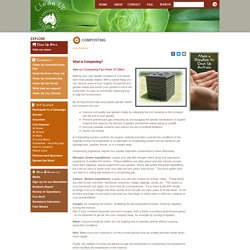
View our Composting Fact Sheet (57.69kb) Making your own garden compost is a lot easier than most people realise. Composting: a guide to making compost at home, using compost tumblers, bins & other composters. ~ Activate your compost. 'Activators' can be added to your compost to help kick-start the process and speed up composting.
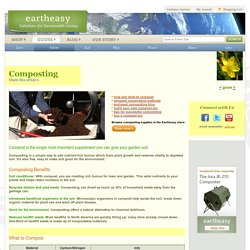
Common compost activator materials are: comfrey leaves, grass clippings, young weeds, well-rotted chicken manure. Types of Composting. Types of Composting / What’s Compost Composting, often described as nature’s way of recycling, is the biological process of breaking up of organic waste such as food waste, manure, leaves, grass trimmings, paper, worms, and coffee grounds, etc., into an extremely useful humus-like substance by various micro-organisms including bacteria, fungi and actinomycetes in the presence of oxygen. Actinomycetes are similar to fungus in the way they grow and spread, but its distinguishing elements are that the types of materials they are efficient at decomposing. The active nature in this microscopic bacteria and the sheer number present (about 10 million per 1 gram of soil), make them highly effective at breaking down materials like tree bark, newspaper, and other hard organic material. The Green Waste Solution: Ethical Bags That Compost.
The Green Waste Solution: Ethical Bags That Compost Green waste makes up over half our household garbage in Australia. That’s a whole lot of delicious nutrients – from the point of view of the plants and worms – that go to waste when thrown in the red bin and carted off to landfill. Even though the organic matter would break down naturally in natural environments, landfill is a dry, oxygen free place where no one stirs the waste or adds the liquid necessary for composting microbes to flourish (that’s usually illegal).
Full Circle Home - Composting. Composting info what's so good about composting? Here at Full Circle, we think it's important to practice what you preach. That's why we don't just sell eco-friendly products; we dedicate our passion and knowledge to helping make it more feasible for you to live a greener lifestyle each and every day. Full Circle Home Composting solutions are our most recent initiative. The Fresh Air and Scrap Happy compost collectors make composting feasible to anyone and everyone.
BioBag World Australia - Online Store. Gardening Australia - Fact Sheet: Clever Composting. Sophie gives some tips on clever composting Presenter: Sophie Thomson, 21/06/2008 Every Australian, on average, produces about 180 kg of food and garden waste a year. If that is sent to rot in landfill, it produces 15.3 kg of methane gas - a toxic greenhouse gas with global warming potential 21 times that of carbon dioxide. Simple composting eliminates the methane, but by digging the compost into the garden, carbon is sunk back into the soil and the organic matter sequesters or captures atmospheric carbon dioxide - all that without even any plants. Domestic Composter. Composting_guidelines.pdf.
Organic waste. Organic waste, or green waste, is organic material such as food, garden and lawn clippings. It can also include animal and plant based material and degradable carbon such as paper, cardboard and timber. Burying organic waste in landfill is a big problem and it’s not just because of the resources we lose. When organic waste is dumped in landfill, it undergoes anaerobic decomposition (because of the lack of oxygen) and generates methane. When released into the atmosphere, methane is 20 times more potent a greenhouse gas than carbon dioxide. Methane is, however, also a valuable resource. WMAA - Compost Australia. Kitchen waste (composting) - Sustainability Victoria. Home composting - City of Melbourne.
There are a number of ways you can reduce your everyday kitchen and garden waste at home. Whether you live in a large house or small city apartment, the City of Melbourne has information on the best options for you. City of Melbourne provides discount compost bins and worm farms to residents. For more information or to purchase a compost bin or worm farm, contact the City of Melbourne on 03 9658 9658. Composting nature's process recycling decomposed organic materials. Composting. Composting: a guide to making compost at home, using compost tumblers, bins & other composters. Cleanupaustralia_factsheet_composting.pdf. Environmental Benefits. Composting. Recycling Machine for Food Waste. 7826-Composting-Plan-of-Management-A4-FA1-LoRes.pdf. World Environment Day - Food Waste Facts. The impact of food waste is not just financial. Environmentally, food waste leads to wasteful use of chemicals such as fertilizers and pesticides; more fuel used for transportation; and more rotting food, creating more methane – one of the most harmful greenhouse gases that contributes to climate change.
Methane is 23 times more potent than CO2 as a greenhouse gas. The vast amount of food going to landfills makes a significant contribution to global warming. Roughly one third of the food produced in the world for human consumption every year — approximately 1.3 billion tonnes — gets lost or wasted. Every year, consumers in rich countries waste almost as much food (222 million tonnes) as the entire net food production of sub-Saharan Africa (230 million tonnes).
Sources: Global Food Losses and Food Waste - FAO, 2011 The environmental crisis: The environment’s role in averting future food crisis – UNEP, 2009. Hot Composting with Melbourne Urban Permaculture. Composting in Collingwood Melbourne Urban Permaculture are a group of volunteers, most of whom have a Permaculture Design Certificate, who work on various projects around Melbourne. From setting up a food forest in Collingwood to designing water harvesting swales in Mill Park, we are excited about getting into hands-on permaculture. We welcome anyone interested to attend our meetings and workshops – the more the merrier! Food waste - City of Melbourne. The City of Melbourne encourages restaurants, cafés and other businesses dealing with food to recycle food waste. The City of Melbourne however, does not generally provide a food recycling service.
Food Waste Recycling Programmes. Eco Guardians - Sustainability by Design. Water Quality Protection - Cornell Composting. Tom Richard Composting has long been viewed as an environmentally beneficial activity. To maintain that positive reputation it is essential that compost facilities consider and mitigate any adverse environmental impacts. Water quality protection can be accomplished at most composting facilities by proper attention to siting, ingredient mixtures, and compost pile management. The results of water quality monitoring studies at Cornell and elsewhere indicate that outdoor windrow composting can be practiced in an environmentally sound manner (Richard and Chadsey, 1994; Rymshaw et al., 1992; Cole, 1994).
However, there are a few aspects of this process that can potentially create problems. A water quality threat? The Community Composting Network. Behind the Scenes Look at Industrial-Scale Composting (Video) The Global Progress of Composting Food Waste. How Industrial Composting Works.